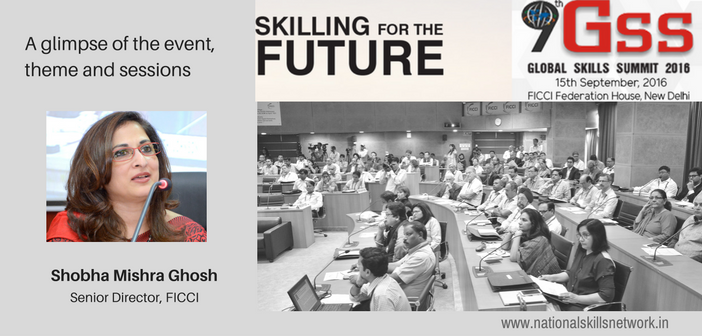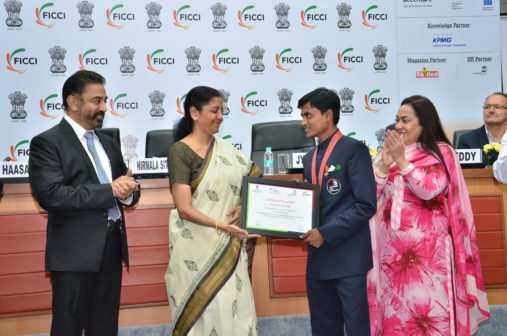As the job market is rapidly transformed by Industry 4.0, there is an urgent need to reflect on the current skill development initiatives, re-engineer the process and reorient ourselves in preparing for the digitally skilled jobs. With “Skilling for Future” being the theme of the upcoming FICCI Global Skills Summit – 9th GSS, 2016, we present to you a Skill Talk by Shobha Mishra Ghosh, Senior Director, FICCI. Let’s read on to know more about FICCI’s contribution to skill development, the context of the event and why Automation, Manufacturing 4.0 and Migration have become the focus areas of the summit.
Incubating the Sector Skill Councils
As the apex business organization in India with national and international linkages, FICCI has been playing a strategic role in facilitating the skilled ecosystem in India. We have been instrumental in incubating 6 Sector Skill Councils (SSCs). We are working closely with the SSCs by providing industry linkages for developing standards, capacity building along with HR, finance and infrastructural support. 70% of the SSC Governing Board members are from the industry including the chairman. We have incubated the Capital Goods, Food Processing, Sports, Media and Entertainment Sector Skill Councils in the last three to four years. Chemical and Petrochemical Sector Skill Council is on its way to be registered and we are also partner and Board member in the Agricultural SSC.
When it comes to providing linkage, a case in point could be how we linked up Food Processing SSC with the UK SSC and organised a to & fro team visit between UK and India for exchange of knowledge and best practices. This has helped in cross-pollination of learnings between both the countries and enriched the SSC. We also work with various State Skill Development Missions (SSDMs). For example, under the DFID project, we are providing technical capacity to Madhya Pradesh and Jharkhand SSDMs.
 FICCI’s role as the ‘voice of the industry’ in skill development
FICCI’s role as the ‘voice of the industry’ in skill development
With NSDC being the nodal body for all SSCs, they have the monitoring mechanism in place to get systematic updates from the SSCs. Our approach is to coordinate with all the SSCs (both FICCI and non-FICCI) and represent their views and experiences to the government.
The entire skill development system in India is still evolving and the challenge is to identify the workforce related problems commonly faced by the industry, streamline the flow of information, institutionalise the Processes and standardize skilling. For instance, critical challenges revolve around mobilizing the rural and semi urban youth to get trained, placing them in the industry ensuring a premium on the training they have undergone and monitoring the movement of the trained youth thereafter for a certain period.
There are some other issues that are sector specific. For example, the textile industry faces the challenge of attrition. And in food processing sector, there is a huge need for skilled human resources in the MSME segment. Then there are several issues in our current labour laws that need to reformed, so we don’t have immediate solutions.
Apprenticeship promotion
Last year, FICCI was to carry out about 40 Apprenticeship workshops supported by Ministry of Skill Development and Entrepreneurship (MSDE) across India. We have conducted about 15 of them, but that drive was stopped because of some unforeseen developments. In the meantime, we’ve been talking to our industry members and launched a CEO4Skill initiative in the last Global Skill Summit. We had our first meeting which included some large enterprises like the Reliance, Havells, Uber, Autodesk, Taj Hotels and many others. Currently, 28000 companies are registered for apprenticeship and this is a dismal number! We’re keen on making apprenticeships attractive and aspirational. On 14th September in FICCI, Delhi, we are organizing a workshop supported by MSDE, Government of India, ILO and World Bank to strategize the next steps in this direction.
Introduction to 9th Global Skills Summit (GSS)
The basic theme of the 9th GSS, “Re-engineering the Skill Eco-system” emerged from the fact that we are moving rapidly towards automation and today we at India are at the cusp of industry 4.0. This marks the next phase of the industry, particularly manufacturing, with the advent of Internet of Things, 3D and Robotics and Automation. Of course, there are bound to be apprehensions about how this trend will affect jobs and impact the need for manual labour. At one end, there could be a downsizing of manpower, but this will also lead to creation of jobs which are high end, which will require more orientation towards technology and digital skills.
Click here to view the detailed program for 9th GSS 2016.

Today, the focus is mostly on skilling for entry level jobs in most of the industry sectors. For example, when you look at the Qualification Packs (QPs) and National Occupational Standards (NOS) of all SSCs, they are at the entry level. There is huge need for enhancing the entry level skills and to include the digital skills. At the same time, we also need to clearly differentiate between human resource intensive sector and the technology-intensive sector and map our skill initiatives accordingly. For example, projects like smart cities have an in-built requirement for digital technologies and will remain technology-intensive. Whereas, hospitality, textile or tourism sectors will largely remain human-intensive though there is a need to bring in the digital component.
Linking the supply-side with the demand-side
Another important objective of GSS is to bring the demand and supply side together. This year as we are focusing on re-engineering the skill ecosystem, the critical aspect is to examine the source of data based on which policy and large programmes are planned. The demand-supply data we are generating is old and scattered. NSSO data is not complete. Perhaps we need to look at EPF and GPF data to get the latest information on job roles in the organized sector. So we have decided to look at yearly data that will give the trends from the organized sector’s job roles. In our report on the theme subject, we are focusing on the need to have a paradigm shift and to reorient ourselves to look at things differently.
The scenario is changing very rapidly and we need to be very agile and mobile to adapt to those changes and that would give us the right perspective. To bring in an industry perspective we are working jointly with NASSCOM and EY to develop a report on Future Jobs and Skills. Another report focused on Manufacturing 4.0 and the impact on skill requirement is also being developed by FICCI for BRICS nations supported by Rolland Berger of Germany. These two papers will be released later this year.
A sneak peek at some key sessions at the 9th GSS 2016
We are bringing in industry to share their plans with respect to skill development. Uber, Connect India, and Sun Group would be launching or showcasing their initiatives, StartInCollege, a startup initiative for students is going to be launched as well. We would also be discussing on issues impacting internal and international labour migration, and linking skills with education to make it aspirational for our youth, These are some of the items on our agenda and we look forward to a productive time during the event and conclude on critical action points.












